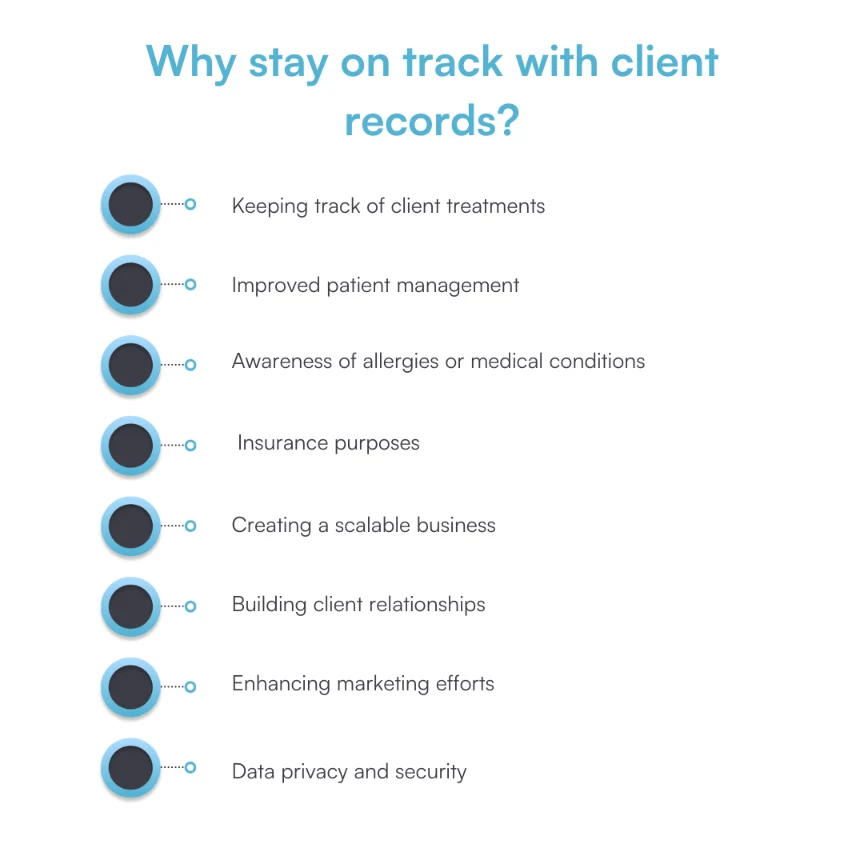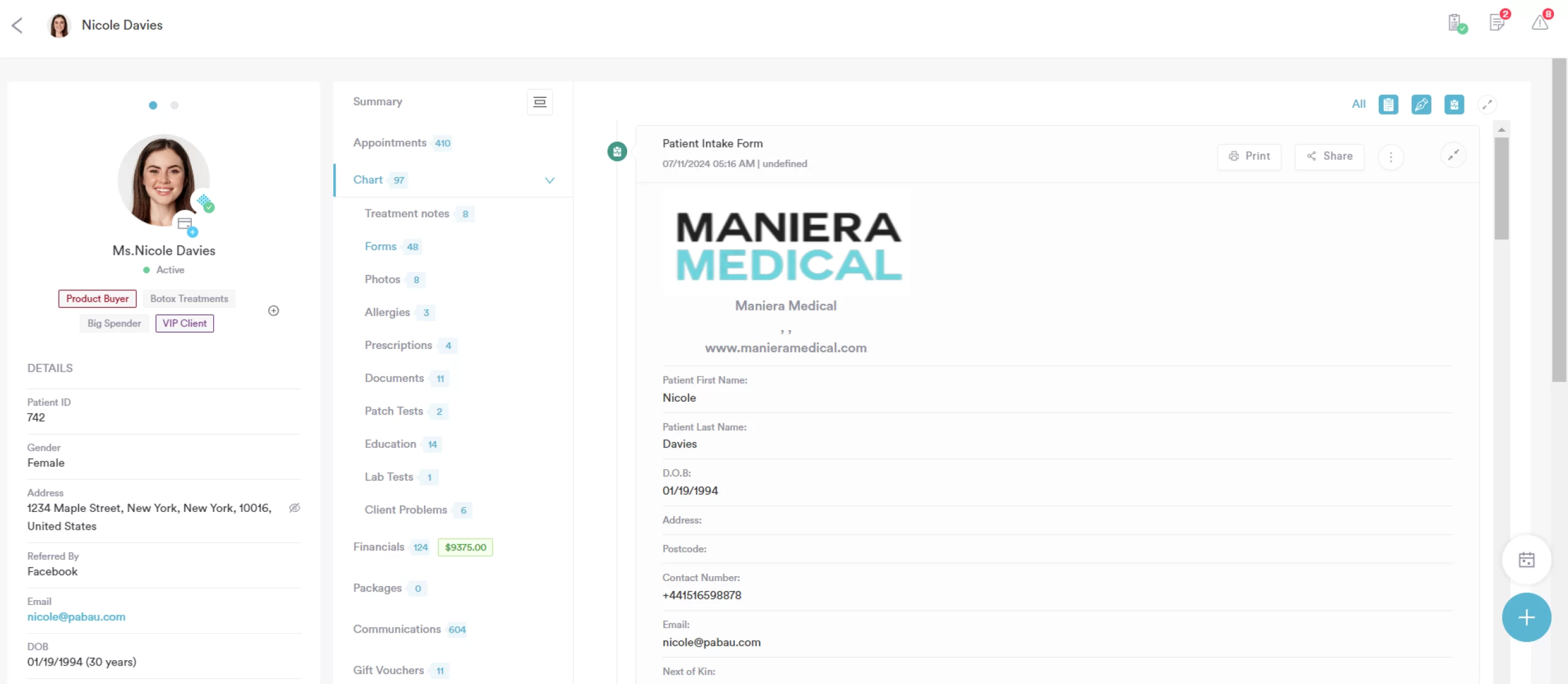On a scale of 1-10, how important would you say keeping your med spa client records up to date is?
It’s up for debate… but we’d go as far as to say they’re one of the most important things you do as a med spa professional.
It might sometimes feel like records are just another piece of admin to be ticked off the list, but records play a vital role in the health of your business, your reputation, and, most importantly, client safety. They can help you elevate your customers’ experience while also acting as the first line of defense if you ever receive a complaint or require a compliance audit.
Not convinced? Our guide will help you learn why it’s crucial, what to include in them, and best practices for keeping client records organized.
What is a client record?
When we talk about client records, we often simply think of notes. However, a client record is much more than just a treatment note.
For a med spa, it could be:
- Before and after photos
- Image mark-ups with injection points
- Charts, skin assessments, or other indicators
- Pre-care and post-care
- Treatment plans
- Patch tests and lab tests
These components form a comprehensive and detailed picture of the client’s history, preferences, and interactions with your med spa.
Why stay on track with client records?
Keeping your clients’ information safe, secure, and updated is critical.
Here’s why you should be keeping your client records up to date, whatever services you provide to them and wherever you provide them:
1. Keeping track of client treatments
This is one of the most important reasons for keeping client records up to date. It provides a clear record of services and products that a client has had, which will help you track progress and replicate the same service in the future. It also helps you to stay sure of what works best for your clients, so that you can provide the best customer care and service for them.
Knowledge is power, right? If you know what works best for your clients you’re in a much better position to provide the best customer care and service for them. Otherwise, a customer can walk in the door and ask for ‘the same as last time’ and you have no idea what that is.
2. Improved patient management
Do you know which of your clients have filled out their consent forms and which ones haven’t? Are you always 100% sure that every client you see has completed a medical questionnaire?
The only way to be certain is by maintaining comprehensive and up-to-date client records.
Keeping all forms and documents neatly in client records is the only way to know – at a glance – if your client has signed their intake form, updated their medical questionnaire, or completed a patch test for the service.
Having all these forms in the client record and available at your fingertips lets you be informed before each appointment, which is a key to effective client management.
3. Awareness of allergies or medical conditions
Some clients forget to mention allergies or medical conditions unless they’re prompted. The last thing you want to do is prescribe or treat them with something that they’re allergic to. That’s why it’s so important to be hyper-vigilant when it comes to keeping client records up-to-date.
You can flag contraindications, know which treatments should be avoided, and ensure that colleagues are aware of allergies or reactions if they treat the same clients.
4. Insurance purposes
Many insurance providers insist on consultations and accurate record-keeping. They’re one of the first things that you can fall back on in the event of needing to claim on your policy, especially if it’s a client that’s raised a claim or legal proceedings against you.
Rather than relying on memory, your records will confirm your account of the facts. Plus, if you don’t have accurate records, your policy could be void anyway. For example, some policies require before and after photos for injectable treatments.
It’s always best to be aware of terms and conditions like this in your insurance before you need to know and it’s too late.
5. Creating a scalable business
When you first start out with your business, you probably treat all your clients yourself. However, this isn’t particularly scalable. Keeping comprehensive client records will enable you to create a system that empowers any qualified practitioner in your business to treat any client.
The practitioner simply has to log into the patient record to access previous treatments and medical history. Meanwhile, it also benefits the client. They can book in with anyone in the practice and know that they’re going to have a cohesive, consistent experience.
6. Building client relationships
Some of your clients may only visit the practice every few months or so. Unless you have a fantastic memory, you’re never going to remember what you chatted about at the last appointment. Right? And that can make building that personal relationship harder.
This is where your client records can come in and do the heavy lifting for you. They can act as a mine of information that you can use to create that personal relationship with your client. Store notes with personal anecdotes, conversation details, or anything else you wish.
All these bits of client information help you make your clients feel seen, heard, valued, and remembered—and nothing beats a relationship like that.
It’s especially important to start building a strong bond with new clients, as it makes them feel welcomed and more likely to become repeat customers, increasing your client retention.
7. Enhancing marketing efforts
Do you know which of your clients you have consent to market to?
Sure, you want to spread the word about your amazing services and offers, but the truth is some people choose not to receive them. You need to know who these two groups are.
Asking for marketing consent is crucial to ensure that your marketing activities comply with legal requirements. It also means you know which of your clients you can contact about offers and services. Keeping your records up to date allows you to do both.
You can check a box on your client records so you know who you should (and shouldn’t) be contacted based on their preferences. Being able to let your clients know about your special offers, loyalty programs and discounts can help you boost your revenue.
8. Data privacy and security
Treating clients also means your med spa collects and stores a lot of sensitive client data. And we know how important it is to keep that data safe and secure.
Regulations like HIPAA and GDPR impose strict data regulation measures, requiring businesses to be proactive about protecting patient data.
Having up-to-date client records is the only way to ensure your clients’ personal data privacy and security meets the required standards.
Additionally, having current client records with accurate and relevant information reduces risks of miscommunication, errors, and data leaks that may compromise client privacy.
Ultimately, your clients entrusted you with their personal and sensitive information. Commitment to keeping their records accurate and up-to-date builds stronger relationships and loyalty.
Are you struggling to keep up with client information and communication? Say goodbye to the hassle of manual record-keeping and hello to efficient communication, streamlined scheduling, and enhanced compliance. Discover Pabau’s built in Electronic Medical Record feature.
What information should be in your client records?
The type of information that you collect will be specific to your business and services. In general, you’ll want to collect the following information as a minimum:
- Full name of the client
- Contact information
- Date of consultation
- Details of the patient’s lifestyle and medical history, where these are relevant to the treatment or service
- Brief description of the therapy or treatment given
- Unusual reactions to the therapy or treatment given
- Details of patch tests carried out, if applicable
- Any allergies and contraindications
- Any medication the client is taking
- Advice or recommendations you give
- Relevant comments made by the client about the therapy you provide
- Treatment records (such as previous treatments, experience and outcomes)
- Details of aftercare advice
- Any consent forms should be kept with the record
- Get your client to sign the form
All of this information won’t need to be updated every time a client visits you, but it’s important to give them the opportunity to review their medical details via the questionnaire they complete before their treatment.
Consequences of poor record-keeping
Poor record-keeping can have dire consequences for both clients and the business.
Incorrect or incomplete records can lead to improper treatments, potentially causing adverse reactions or ineffective results. It can also cause a lot of headaches and more serious outcomes, nerve-wracking lawsuits, and even the closure of the business.
For example, if you don’t have detailed records confirming the contraindications and risks of a procedure that were explained to a client before it was undertaken, it can be a hard basis for a lawsuit.
In the med spa sector, being lax with record-keeping also carries risks…
- Providing a treatment with a specific ingredient to which a client is allergic
- Over-treating because you’re not keeping track of the number of treatments
- Not being equipped to respond to or manage customer complaints
- Not having appropriate documentation for consent compliance audits
- Data breach of confidential medical information
- Loss of trust and irreparable reputation damage
You may also find yourself administrating a treatment when circumstances have changed – i.e., treatments that are advised to avoid in pregnancy, such as injectables, chemical peels and laser and Intense Pulsed Light (IPL) treatments.

How often should you update client records?
Once a week, once a month, every six months?
No, you should update your client records every time the client comes in for treatment. A good practice management software can help you with this – it’s the only way you make sure your records are up-to-date.
How should client records be maintained?
There are various ways to maintain your records, but some are better than others.
Some practitioners, especially early in the business, start with pen and paper, but soon realize this is quite limiting.
Paper records take up valuable space, are costly to store, are a hassle to manage, and are susceptible to damage from fire or water. Not to mention the fact that you have to be on-site to be able to access them.
No one really wants to have to rifle through dusty filing cabinets, do they?
Yes, there is a better way. Digital client records allow you to work faster and smarter, with the added value of increased availability, security and compliance.
But we’ll get to that in a bit.
How long should you keep your client records?
How long you store client records depends on the type of practice and the location.
In the US, the period for keeping client records in medical spas can vary based on state regulations and specific professional guidelines.
HIPAA doesn’t have a specific retention period for medical records, but it requires certain documentation (such as policies, procedures, and various records related to its Privacy and Security Rules) to be retained for a minimum of six years from the date of its creation or the date it was last in effect, whichever is later.
Make sure you review the correct period you should keep them for in the state-specific medical records retention laws.
The UK’s guidance on the retention period of medical records states that most health records are kept for eight years after the last treatment.
Nevertheless, ideally, you want to keep client records for as long as possible. A claim can be raised up to three years after a client becomes aware of a problem.
How to store client information safely
Paper is quite trusted, especially by people from medical backgrounds.
However, paper is less efficient, adds more manual work, and can leave you in the lurch (and open to a huge fine). As you handle the data your clients entrust to you, data protection is your top priority, and paper can’t deliver.
So what’s the solution?
There are different solutions, such as downloadable client records on Etsy. But they can’t help you with before and after photos, charts, and automatically pulling through information from your medical questionnaires and intake forms. They also won’t build collecting patient data into your overall process, so you could simply forget.
The solution? Keep reading to the next section below.
Best practices for keeping client records up to date
Below, we’ll give you a rundown of best practices for keeping client records up to date.
Use practice management software
Practice management software is a comprehensive digital tool that med spas and healthcare practices use to streamline manual administrative and operational tasks, optimize workflows and give clients the best experience.
This type of system stores client information in one digital, cloud-based location, making it easy to access and update records from anywhere.
All you need is a wi-fi connection.
It also integrates robust client records that includes everything you need to know about your clients like treatment plans, allergies, patch tests, any medical conditions, all communication between them and your practice, and more. So, you can access everything you need to know with in a click.
As one of the top practice management systems, Pabau does a great deal of heavy lifting for your client record-keeping with:
- Secure and flexible access: You can securely log in and work from anywhere and on any device with an internet connection (someone said flexible and remote work?).
- Dictation tool: Record your treatment notes with a dictation tool that precisely transforms your audio notes into text. All audio notes are stored in the client file, which you can review, edit, and e-sign before sharing with patients.
- Flagging contraindications: You can choose from a list of allergies and store the SNOMED code in the client record, and use the BNF drugs database for prescribing, which will flag any contraindications.
- Date-stamped face-mapping: Use Pabau’s injecting plotting tool to accurately plot the injection points on a client’s photograph in the areas where they’ve had treatment. You can even add the batch information and expiration date.
- Digital pre-care and post-care instructions: Sending a client these instructions by email is stored on the client record on Pabau. There’s a digital record that it’s been sent, compared to a paper leaflet, which is much easier when it comes to compliance audits.
- Patient journey on an iPad: The patient journey requires the clients to review and update their medical information every time they visit, making record-keeping a lot simpler. Any fields that they update will map to the client card on the system.
- Before and after photos: Pabau prompts you to take before-and-after photos when the patient comes for the appointment. The high-resolution photos are automatically uploaded to the client record. You can create comparisons sliders and albums, track clients’ progress and show them the amazing results.
- Client portal for self-service: Enables clients to update their own medical information via the client portal. You can disable this functionality if you’d prefer to be in control.
Establishing a routine for updating records
Clients’ personal and health information may change, and their records must reflect every change relevant to the treatment and their overall well-being.
Up-to-date records help you have current information at your fingertips to make well-informed decisions, stay compliant, and provide personalized treatments.
Here are some tips on how to do it so it’s easier for you and your team:
- Use a tool with an in-clinic client journey and allow your clients to review and update their medical questionnaires every time they visit. Any updates are directly pulled into their client record, so you always have up-to-date information.
- Send forms automatically in the confirmation email when an appointment is booked, so clients can review their forms from their comfort of their home.
- Make forms mandatory for online bookings, so clients fill them out before coming in for the appointment (and you don’t have to rush to do them in-person.)
Streamline appointment scheduling and follow-ups
Your client record-keeping process starts before a client visits – in appointment scheduling and continues after they leave – with follow-ups.
Therefore, you need a streamlined and efficient scheduling process to ensure that all client and appointment details are accurately updated in the client records when the appointment is booked — this includes date, treatment, consent forms, intake forms, payment info, etc. Why do it manually when there’s a tool for that?
Meanwhile, automated follow-ups help your clients stay on track with their treatment plans and get the best results. Consistency is key in med spa treatments.
Practice management software does both: it updates appointment details in each client record in real time and automatically sends follow-up emails to clients.
This means you don’t need one tool for scheduling, one for managing records and a third for sending recalls and reminders. You have one system that does it all.
💡 Pro tip
You can choose from a selection of ways to present the photos. Put them in a timeline to track the client’s progress, add different treatments to different albums, and share them with the client directly via a unique link.
Train staff on procedures
Your staff are on the front line with clients and working with client information. So it’s essential that they know the importance of keeping records up to date and how to do so effectively.
Provide robust and regular training to ensure everyone is on the same page and follows the record-keeping procedures.
To make it easier and more understandable:
- Documentation is key, so make sure to create detailed training manuals or guides with step-by-step instructions.
- Familiarize staff with your practice management software and how to use it for managing records safely and efficiently.
- Make sure there are clear rules on who is allowed to access records and who is not. Or, use software that implements this for you.
- Keep staff informed about changes in laws, regulations, and industry standards related to record-keeping.
- Schedule ongoing training sessions to refresh staff knowledge and introduce new procedures or technologies.
Manage client records efficiently with Pabau
Keeping your med spa client records current is not just a day-to-day task. It’s the cornerstone of providing high-quality care and maintaining a successful practice.
By ensuring your records are accurate, comprehensive, and up-to-date, you enhance client safety, comply with regulations, and build strong client relationships.
As software specialized for med spas, Pabau makes it much easier to manage your client records and keep their info safe and secure with features like:
- Role-based access and robust security
- Step-by-step client journey
- Built-in consent and intake forms
- Image mark-ups and before and after photos
- Integrated scheduling
Invest in proper record-keeping practices to secure the trust and loyalty of your clients for the future. Book your demo and enjoy seamless client record management.🌟






